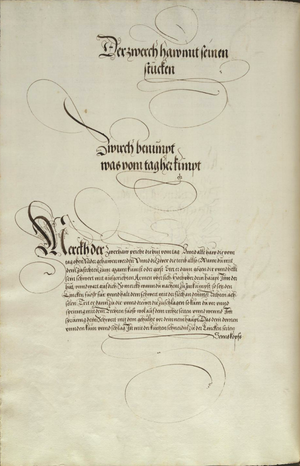|
|
You are not currently logged in. Are you accessing the unsecure (http) portal? Click here to switch to the secure portal. |
Difference between revisions of "User:Kendra Brown/Latin Lew/85v"
Jump to navigation
Jump to search
Kendra Brown (talk | contribs) |
|||
| Line 1: | Line 1: | ||
Munich 85v / PDF page 16 | Munich 85v / PDF page 16 | ||
| + | [[File:Cod.icon._393_I_085v.jpg|thumb|Page scan]] | ||
== Missing Zettel verse from Dresden 91v (20) == | == Missing Zettel verse from Dresden 91v (20) == | ||
| − | + | [[File:MS_Dresd.C.93_091v.png|thumb|Page scan]] | |
=== German === | === German === | ||
Revision as of 20:06, 19 January 2021
Munich 85v / PDF page 16
Contents
Missing Zettel verse from Dresden 91v (20)
German
- Zwirch benimpt
- was vom tag her kimpt
English
- Crosswise takes away
- what comes From the Day.
16 a
16 a Latin (Sandbox)
- Habitus, et varii
- Usus Transversarij.
- Is Ictus custodiam de die .i. eu[m] qui iam describetur,
- ictu[m] repellit,
- insup[er] et reliquos,
- qui de die è supernè deorsum feriuntur.
- Transversarium ita exerceas.
- Si adversari[us] contra te consistat,
- atq[ue] ensem sustulerit brachijs sublatis in custodia,
- te expectans,
- tu si propius ad eu[m] concesseris curabis,
- ut sinistr[um] pr[a]eponas pedem,
- ensis latitudine[m],
- seu planidum ensem iuxta dextrum humeru[m] contineas.
- at si is contra te proxime progreditur minaturq[ue],
- tunc eu[m] pr[a]evenire cures,
- dextroq[ue] pede prosilias in latus itide[m] dextru[m] tuum,
- subito ensis capulu[m] pro capite convertens ita ut pollex substet,
- inde aute[m] latus capitis hostilis sinistru[m] acie brevi quassato.
16 a English
- Gestures, and various Uses of the transverse.
- THAT strike [verbs] the guard of the day. first, this which is described now,
- drives back a strike,
- from above and the remaining,
- which is struck from the day from above and below.
- Thus practice the transverse.
- If the adversary stands against you,
- and lifts his sword (the arms having been lifted) in the guard,
- (awaiting you),
- if you will take care you will have conceded closer to him,
- in order that you put the left foot forward,
- (the width of a sword),
- or if you hold the flat of the sword next to the right arm/elbow.
- and if he advances and threatens close against you,
- then take care to precede him,
- and leap with your right foot into your right side in the same way,
- suddenly rotating the hilt of your sword in front of your face so that the thumb stands firm,
- thence you batter the left side of the head of the enemy with the short edge.
16 a notes
- Note that the zufechten isn't right at the beginning in the german, but in the latin it's nearly in the middle (thanks to the weird first sentence)
- Latin has ignored the "Break the guard" idea entirely
- from Vienna 93r
- IS ictus custodiam de die. id est eu[m] qui iam describetur, ictum repellit, insuper et reliquos, qui de die è supernè deorsum feriuntur. Transversarium...
- the way the title is written creates a rhyming pair, but maybe that's just an accident of declension.
16 b
16 b Latin
Sin vero is te p[re]venerit, tu[m] pede dextro addita pr[a]escripta modò defensione ictum hostile[m] devita[n]s in latus dextr[um] tuu[m] prosilias, p[re]dictu[m]q[ue] locu[m] tra[?]nsversario ictu co[n?]cutias.
16 b English
But if, in contrast, he arrives before you, then (the right foot having been inserted as directed [above] only for defense), you leap forward into your right side avoiding the strike of the enemy, and, as said in the preceding place, you crash together in the transverse strike.

